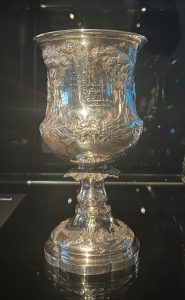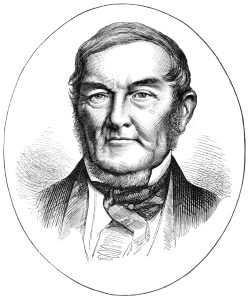National Trust collections continue to reveal treasures, reflecting our evolving awareness of Tasmania’s heritage. A recently rediscovered treasure is the silver cup presented to Zephaniah Williams (1795-1874) c1857, currently on loan from the Trust’s Latrobe Court House Museum to Unshackled – The True Convict Story, at the Tasmanian Museum and Art Gallery.
Cup presented to Zephaniah Williams (1795-1874) c1857
Silver, hallmarked for London, 1853, and embossed with agricultural scenes
National Trust of Australia (Tasmania), Latrobe Court House Museum, T1986-020
Zephaniah Williams (1795-1874) was born at Methyr Tydfil in Wales, where he worked as a coalminer from an early age. In his youth he became involved in the Chartist Movement. Chartism was a British movement for political reform that took its name from the People’s Charter of 1838. It had particular support in places such as the South Welsh coalmines where people depended on single industries and were subject to wild swings in the economy. The People’s Charter called for six reforms to make Britain’s political system more democratic:
- A vote for every man aged twenty-one years and above.
- The secret ballot to protect the elector in the exercise of his vote.
- No property qualification for members of Parliament to allow the constituencies to return the man of their choice.
- Payment of members of Parliament, enabling working men to leave or interrupt their livelihood to attend to the interests of the nation.
- Equal constituencies, securing the same amount of representation for the same number of electors and the creation of new constituencies e.g. for Manchester that developed as a major industrial centre in the 19th
- Annual parliamentary elections.
Britain adopted the first five reforms after 1857.
Williams led a protest march of 3,000, mainly coal miners that ended with the Newport Rising in 1839. For this he was sentenced to death for high treason but was instead transported to Van Diemen’s Land, arriving on the Mandarin in June 1840.

Williams was sent to Port Arthur and became overseer of the Saltwater River Coal Mines. Granted a Ticket-of-Leave in 1849 he began coalmining at Hobart, and in 1852 went north to the Mersey Coal Fields where he established successful mines and developed the township of Tarleton. A grateful community presented him with a silver cup inscribed, “Presented to Mr Zephaniah Williams by those interested in Port Frederick on the Mersey for his perseverance and industry in opening the coal fields in that vicinity”. Williams’ wife Joan joined him in 1854 and he was granted a full pardon by the Lt-Governor in 1857.

